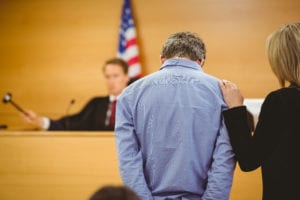
Should defendants in Michigan be required by law to hear victim impact statements
Chances are, you’ve heard about the Larry Nassar case in Ingham County and his second case in Eaton County. Maybe you also heard about his federal kiddie porn conviction. In fact, it would be hard to miss it, with the related MSU scandal, the new legislation inspired by Nassar’s charges, and the sensational sentencing hearing that captured the western world’s imagination. (They even followed it in Canada, parts of Britain, and some European countries!) However, one of the issues that comes up with regards to the trial, has to do with those victim impact statements.
Nassar sat through hundreds of victim impact statements
Judge Rosemarie Aquilina, who presided over Nassar’s trial in Lansing, allowed every one of his victims who wanted to, a chance to address the court at his sentencing. A total of 216 women and girls in two counties came forward and spoke to the courts at the Nassar sentencing hearings. Those hearings continued for days in order to allow all the victims a chance to speak. Every one of them claims to have been sexually abused by Nassar during medical treatments he administered.
It was an unprecedented scenario, and one that Nassar objected to at the very beginning. He wrote a letter to the Ingham County judge, saying that he couldn’t stand the emotional experience of having to hear his victims’ impact statements, and that he feared for his emotional and mental health. Judge Aquilina dismissed his concerns, and insisted that he sit through each and every one of them. But not every defendant has been quite so quiescent.
Jeffrey Willis walked out of court and refused to hear a single one
Jeffrey Willis, who was convicted of the murder of Rebekah Bletsch, refused to sit through the victim impact statements given by Rebekah’s family members at his sentencing. He walked out of his November 2017 sentencing hearing, blowing a kiss to the packed courtroom as he left. It was an insult that Jessica Josephson, Rebekah’s sister, took very personally. And as she recently explained to the state House Law and Justice Committee, it stripped her of an important part of her grieving process.
Josephson testimony to the Justice Committee was in support of a new bill introduced by House Representative Holly Hughes. The legislation, introduced in January 2018, would require defendants to listen to the victim impact statements given at their sentencing hearings, in the same way that Nassar did.
Rebekah Bletch’s family says they were robbed of their healing process
As Josephson explained to the Committee, “What’s the point of an impact statement if I can’t speak it to the person who has impacted me and destroyed my family? No other family should have to feel their words and their heartache don’t matter. Victims have a right to be heard and express their feelings to the individuals who caused it.”
In his letter to Judge Aquilina in Lansing, Nassar explained that he had only pled guilty to the charges to save the community and his family the stress of a trial. However, he pointed out to Judge Aquilina that by allowing all of his victims to speak at his hearing, she was subjecting him to unnecessary stress, which was bad for his mental health. The judge dismissed his concerns and reminded him that the terms of his plea agreement were that he would be required to listen to victim impact statements. So he had no choice.
Should defendants be required to listen to victim impact statements?
But should other defendants have the choice? Should a convicted criminal be required to sit and listen to the impact statements given by their victims and their victim’s loved ones? State Rep. Hughes says yes, and his her bill is signed into law it would update the William Van Regenmorter Crime Victim Rights Act, which defines the current procedures used in Michigan courtrooms to protect victims. If adopted, House Bill 5407 would be known as the Rebekah Bletsch law.
In reality, Nassar could have refused to enter the courtroom to hear the victim impact statements according to the criminal defense lawyers at The Kronzek Firm. He is going to spend the rest of his life in prison so there isn’t much more punishment any of the judges in Michigan could have handed out to him beyond life in prison. The law as it presently stands, if to give victims a chance to be heard by the court. It has nothing to do with requiring the defendant to hear the victims speak. Perhaps House Bill 5407 will change that.







